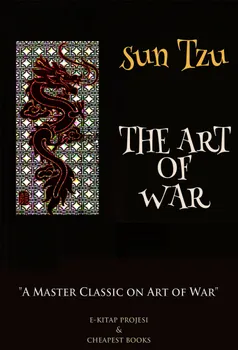The Art of War is an ancient Chinese military treatise dating from the Late Spring and Autumn Period (roughly 5th century BC). The work, which is attributed to the ancient Chinese military strategist Sun Tzu ("Master Sun", also spelled Sunzi), is composed of 13 chapters. Each one is devoted to an aspect of warfare and how it applies to military strategy and tactics.For almost 1,500 years it was the lead text in an anthology that would be formalised as the Seven Military Classics by Emperor Shenzong of Song in 1080. The Art of War remains the most influential strategy text in East Asian warfare and has influenced both Eastern and Western military thinking, business tactics, legal strategy and beyond.Scholars do not know how The Art of War came to beand whether or not Sun Tzu, if he existed, had anything to do with its creation. What they do know is that copies of the book, typically written on sets of sewn-together bamboo slats, ended up in the hands of politicians, military leaders and scholars across China. From there, translated copies of Sun Tzus work found their way to Korea and Japan. (The oldest Japanese version dates from the 8th century A.D.)For more than 1,000 years, rulers and scholars across Asia consulted The Art of War as they plotted their military maneuvers and imperial conquests. Japanese samurai, for example, studied it closely. However, it did not reach the Western world until the end of the 18th century, when a Jesuit missionary translated the book into French. (Historians say that the French emperor Napoleon was the first Western leader to follow its teachings.) It was finally translated into English in 1905.INTRODUCTION:Sun Tzu Wu was a native of the Ch`i State. His Art of War brought him to the notice of Ho Lu, King of Wu. Ho Lu said to him: I have carefully perused your 13 chapters. May I submit your theory of managing soldiers to a slight test?Sun Tzu replied: You may.Ho Lu asked: May the test be applied to women?The answer was again in the affirmative, so arrangements were made to bring 180 ladies out of the Palace. Sun Tzu divided them into two companies, and placed one of the King's favourite concubines at the head of each. He then bade them all take spears in their hands, and addressed them thus: I presume you know the difference between front and back, right hand and left hand?The girls replied: Yes.Sun Tzu went on: When I say Eyes front, you must look straight ahead. When I say Left turn, you must face towards your left hand. When I say Right turn, you must face towards your right hand. When I say About turn, you must face right round towards your back.Again the girls assented. The words of command having been thus explained, he set up the halberds and battle-axes in order to begin the drill. Then, to the sound of drums, he gave the order Right turn. But the girls only burst out laughing. Sun Tzu said: If words of command are not clear and distinct, if orders are not thoroughly understood, then the general is to blame.
The Art of War : "A Master Classic on Art of War"
Commencez ce livre dès aujourd’hui pour 0 €
- Accédez à tous les livres de l'app pendant la période d'essai
- Sans engagement, annulez à tout moment
Auteurs :
Langue :
anglais
Format :
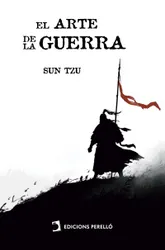
El arte de la guerra
Sun Tzu
book
El Arte de la Guerra
Sun Tzu
book
The Art of War
Sun Tzu
book
El Arte de la Guerra :
Sun Tzu
audiobookbook
The Definitive Strategy Collection: 6 Works From Sun Tzu, Homer, Machiavelli, and Miyamoto Musashi : The Art of War; The Prince; The Book of Five Rings; On War; The Iliad; & The Odyssey
Sun Tzu, Niccolo Machiavelli, Miyamoto Musashi, Carl von Clausewitz, Homer
audiobook
The War Collection: 12 Essential Battlefield Classics : Homage to Catalonia, Looking Back on the Spanish War, Middle Parts of Fortune, On War, Storm of Steel, The Iliad, & More
George Orwell, Frederic Manning, Carl von Clausewitz, Ernst Jünger, Sun Tzu, Homer, Sigmund Freud
audiobook
Sun Tzu's The Art of War - Unabridged :
Sun Tzu
audiobook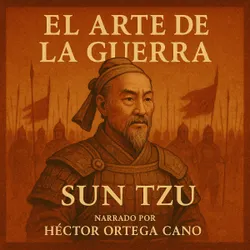
El Arte de la Guerra — Estrategias Eternas de Sun Tzu para la Vida y el Liderazgo : Sabiduría militar, filosofía oriental y tácticas de liderazgo aplicadas a los desafíos modernos
Sun Tzu
audiobook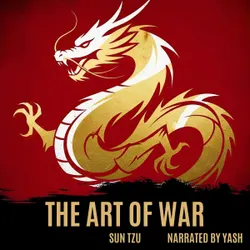
The Art of War :
Sun Tzu
audiobook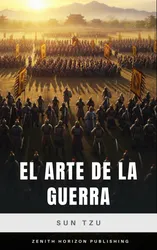
El Arte de la Guerra : El Manual de Estrategia y Sabiduría que Ha Inspirado a Líderes Durante Siglos
Sun Tzu
book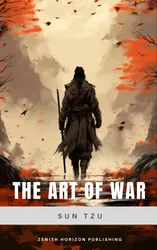
The Art of War : Sun Tzu's Timeless Strategy Manual for Success in War, Business, and Life
Sun Tzu
book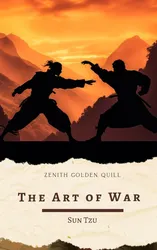
The Art of War : The Most Influential Military and Leadership Text in History
Sun Tzu
book
